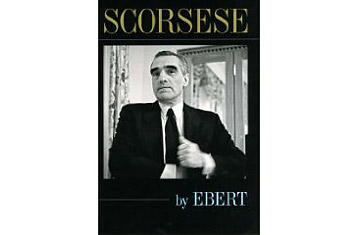
Scorsese By Ebert
By Roger Ebert
The University of Chicago Press; 314 pages
The Gist: Over the last 40 years, film critic Roger Ebert has made a regular habit of championing independent films and little-known directors. And so it was in November of 1967 when, after being a film critic for only seven months, he went out on a limb to lavish praise on a first-time filmmaker by the name of Martin Scorsese — penning the first-ever writeup for this unknown New Yorker whose debut feature I Call First premiered at the Chicago International Film Festival.
Scorsese clipped and cherished that early review, and in the introduction to his latest book, Scorsese By Ebert, Ebert says that first feature film flagged Scorsese as a director to watch: "This film had a quality that sent tingles up my arms. It felt made out of my dreams and guilts ... Everything about that movie stabbed me in the heart and soul. I had seen great films, I had in truth seen greater films, but never one that so touched me. Perhaps it was because of that experience that I became a film critic, instead of simply working as one."
Scorsese By Ebert is a film-by-film chronicling of the professional, yet passionate, Ebert-Scorsese relationship. Packaged together are every Ebert review of a Scorsese title, as well as an array of essays, interviews, and the transcript of an on-stage discussion between the director and writer at The Ohio State University in 1997. Ebert has also gone back to write an additional "reconsideration" of a half-dozen select Scorsese titles. Even for those who consider themselves devout fans of the Scorsese canon, Scorsese By Ebert helps readers to see the overriding arc that connects his various titles — the themes of guilt, sin, ego and hope that surface time and again.
Highlight Reel:
1. Ebert's reconsideration of I Call First (later released as Who's That Knocking At My Door:) "It is all there, in the first film, almost all in the first twenty minutes: the themes and obsessions, the images and character types that would inspire Martin Scorsese for the whole of his career. A shot of his mother, kneading pasta. A statue of the Virgin Mary. Young men from the neighborhood, in an argument that explodes into a fight. Rock and roll on the soundtrack. A headlong, hand-held shot preceding the two fighters as one tries to escape down the sidewalk and the other chases him, hitting him with a pole. A high-angle view from across the street of the Eighth Ward Social Club ... It is remarkable that a director would set out his agenda so clearly, almost instinctively, at the start of his career."
2. Ebert on Goodfellas: "[Henry Hill] loves it when the head waiters know his name, but he doesn't really have the stuff to be a great villain ... he wants the prizes, but he doesn't want to pay for the tickets. And it's there, on the crux of that paradox, that the movie becomes Scorsese's metaphor for so many modern lives. ... He simply uses organized crime as an arena for a story about a man who likes material things so much that he sells his own soul to buy them."
3. Ebert on The King of Comedy: Martin Scorsese's The King of Comedy is one of the most arid, painful, wounded movies I've ever seen. It's hard to believe Scorsese made it; instead of the big-city life, the violence and sexuality of his movies like Taxi Driver and Mean Streets, what we have here is an agonizing portrait of lonely, angry people with their emotions all tightly bottled up. This is a movie that seems ready to explode — but somehow it never does."
4. Ebert on The Departed: "It is intriguing to wonder what Scorsese saw in the Hong Kong movie [2002's Infernal Affairs] that inspired him to make the second remake of his career (after Cape Fear) ... I have often thought that many of Scorsese's critics and admirers do not realize how deeply the Catholic Church of pre-Vatican II could burrow into the subconscious, or in how many ways Scorsese is a Catholic director. This movie is like an examination of conscience, when you stay up all night trying to figure out a way to tell the priest: I know I done wrong, but, oh, Father, what else was I gonna do?"
The Lowdown: A work of obvious affection, even adoration, what might surprise readers most is how Scorsese By Ebert emerges as a work of profound identification. In his foreword, Scorsese acknowledges that Ebert closely shares his love of film, his religious roots, and his moralistic worldview. Ebert picks up on that theme in his introduction: "We were born five months apart in 1942 ... We were children of working-class parents ... We attended Roman Catholic schools ... We memorized the Latin of the Mass ... We went to the movies all the time."
Long before they ever met each other, these two were kindred spirits. Scorsese's films spoke with a tone that Ebert had never heard before, and Ebert was Scorsese's champion well before the director became a household name. As the two have grown old and famous together, this back-and-forth has become a compelling — perhaps even defining — dialogue in their careers. "We have never become close friends. It is best that way," Ebert writes in his introduction. "We talk whenever he has a new film coming out, or at tributes, industry events, or film festivals. We have dinner. We sense things in common. But I do not take him for granted. I consider him the most gifted director of his generation and have joked that I will never stop writing film reviews until he stops making films."
Verdict: Read
